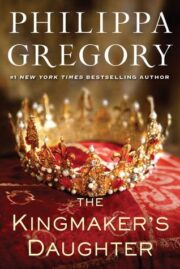ST MARTIN’S, LONDON, MAY 1472
I tell myself that this is different – that this time I am marrying and it is my own choice, I am not dominated by a terrifying mother-in-law, I am not mindlessly obeying my father. This time I am making my own destiny – for the first time in my life I have been able to take matters into my own hands. I am fifteen, I have been married and widowed, the daughter-in-law of a Queen of England and then the ward of a royal duke. I have been a pawn for one player after another; but now I am making my own decision and playing my own cards.
Richard is waiting at the chancel steps; his kinsman and mine, Archbishop Bourchier, stands before him, with his missal open at the marriage service. I look around the chapel. It is as empty as for a pauper’s funeral. Who would have thought this was the marriage of a dowager princess and a royal duke? No sister – she is now my enemy. No mother – she is still imprisoned. No father – I will never see him again. He died trying to put me on the throne of England and he and his hopes are finished. I feel very alone as I walk up the aisle, my leather shoes tapping on the memorial stones beneath my feet as if to remind me that here, lying in unending darkness, are all the other people who thought that they too would play their own cards.
We have nowhere to go. That is the great irony of our situation. I am the greatest heiress in England with an inheritance, if we can win it, of hundreds of houses and several castles and I have brought them all to my husband, himself a wealthy young man with revenues from some of the greatest counties in England – and we have nowhere to go. He cannot take me back to his London home – Baynard’s Castle – for his mother lives there and the formidable Duchess Cecily frightened me enough as my sister’s hard-faced mother-in-law; she will terrify me as my own. I dare not face her at all after making a secret wedding to one of her sons, against the wishes of the other two.
Obviously we cannot go to George and Isabel, who will be beside themselves with anger when they learn of this day’s doings, and I absolutely refuse to return to the guest house of St Martin’s in my kitchen maid’s cloak. In the end, our kinsman the archbishop, Thomas Bourchier, invites us to his palace for as long as we want to stay. It identifies him even more closely with this secret marriage, but Richard whispers to me that the archbishop would never have opened the marriage service before us if he had not had Edward’s private permission to perform it. Not much happens in England now without the knowledge of the York king and the assent of his queen. So though I had thought we were rebellious lovers, acting in secret, marrying for love and hiding for our honeymoon, it was not so. It was never so. I had thought I was planning my own life, without the knowledge of others; but it turns out that the king and my enemy, his grey-eyed queen, knew of it all, all the time.
LAMBETH PALACE, LONDON, SUMMER 1472
Now I understand Isabel’s slavish loyalty to George. Now I understand the passionate bond between the king and the queen. Now I even understand the queen’s mother Jacquetta dying of heartbreak at the loss of the man she married for love. I learn that to love a man whose interests are mine, whose passion is given freely and openly to me, and whose battle-hardened young lithe body lies beside me every night as his only joy, is to utterly change my life. I was married before; but I was never shaken and touched and puzzled and adored before. I was a wife but I was no lover. With Richard I become wife and lover, counsellor and friend, partner in all things, comrade in arms, fellow-traveller. With Richard I become a woman, not a girl, I become a wife.


"The Kingmaker’s Daughter" отзывы
Отзывы читателей о книге "The Kingmaker’s Daughter". Читайте комментарии и мнения людей о произведении.
Понравилась книга? Поделитесь впечатлениями - оставьте Ваш отзыв и расскажите о книге "The Kingmaker’s Daughter" друзьям в соцсетях.